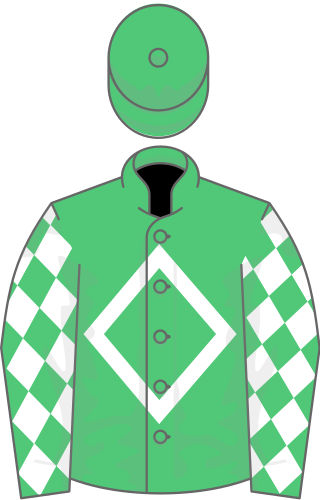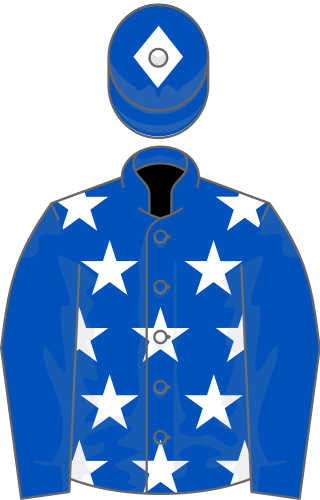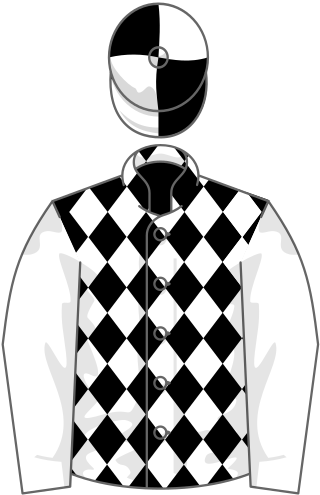
Time Charter was an Irish-bred, British-trained Thoroughbred racehorse and broodmare who won several major middle-distance races between 1982 and 1984. After winning twice as a two-year-old in 1981, she developed into a classic filly in the following year, finishing second in the 1000 Guineas before winning The Oaks in record time. Later that year she won the Sun Chariot Stakes before beating a field of colts and older horses by seven lengths in the Champion Stakes. As a four-year-old she won England's premier weight-for-age race, the King George VI and Queen Elizabeth Stakes and successfully conceded seven pounds to the outstanding French filly All Along in the Prix Foy. In 1984 she recorded an impressive four length victory in the Coronation Cup and was retired from racing at the end of the year having won nine of her twenty races. She later became a very successful broodmare.

Juliette Marny was a British Thoroughbred racehorse and broodmare best known for winning the classic Epsom Oaks in 1975. After being beaten in both her races as a two-year-old and disqualified on her three-year-old debut, the filly won the Lingfield Oaks Trial, the Oaks Stakes and Irish Oaks before her career was ended by injury in the Yorkshire Oaks. She was then retired to stud, where she had some success as a broodmare.
Fairy Footsteps was a British Thoroughbred racehorse and broodmare best known for winning the classic 1000 Guineas in 1981. She showed promise in her first two races as a two-year-old before establishing herself as one of the best fillies of her generation with an emphatic win in the Waterford Candelabra Stakes. In the spring of 1981 she was heavily backed for the 1000 Guineas before and after a win in the Nell Gwyn Stakes. She won the 1000 Guineas by leading all the way and was considered highly likely to follow up with a win in the Epsom Oaks but was retired after a disappointing defeat in the Musidora Stakes. She had some success as a broodmare.

Blue Wind was an Irish Thoroughbred racehorse and broodmare best known for winning the classic Oaks Stakes in 1981. She showed promising form as a two-year-old in 1980 when she won two of her five races including the Silken Glider Stakes. In the following year she finished second in the Irish 1,000 Guineas and then showed her best form when moved up in distance, winning the Oaks by seven lengths and following up in the Irish Oaks a month later. In 1982 she was campaigned in the United States without success. She made no impact as a broodmare.

Scintillate was a British Thoroughbred racehorse and broodmare best known for winning the classic Oaks Stakes in 1979. She showed promising form as a two-year-old although she failed to win in three races. After recording her first win in the Sandleford Priory Stakes in the following spring she won the Oaks as a 20/1 outsider. She ran poorly in two subsequent races and was retired to brood where she had limited success as a broodmare.

Fair Salinia was a British Thoroughbred racehorse and broodmare best known for winning the classic Oaks Stakes in 1978. In a racing career which lasted from September 1977 until September 1978 she won four of her eight races. As a two-year-old in 1977 she won on her debut before finishing second in the Cheveley Park Stakes. As a three-year-old she finished second in the 1000 Guineas before being moved up in distance and winning the Oaks, Irish Oaks and Yorkshire Oaks. She was retired to stud at the end of the season and had some influence as a broodmare. She died in 2004 at the age of twenty-nine.
Cherry Hinton was an American-bred, British-trained Thoroughbred racehorse and broodmare. Despite never competing above Group Three level, she was officially rated the best two-year-old filly in Britain, and was rated the best juvenile filly in Europe by Timeform. She ran well in defeat in her first two races before winning the Tadcaster Stakes at York Racecourse and then establishing her reputation with a wide-margin victory in the Argos Star Fillies' Mile. She was expected to play a leading role in the following season's classics but had a series of training problem and failed to win in three starts. She later had some success as a broodmare.
Durtal was an Irish-bred, British-trained Thoroughbred racehorse and broodmare. She was the best British-trained two-year-old filly of 1976 when she won three of her five races including the Cheveley Park Stakes, and finished second in both the Lowther Stakes and the Champagne Stakes. In the following year she won the Fred Darling Stakes and finished second in the Poule d'Essai des Pouliches before being injured shortly before the start of the Oaks Stakes, a race for which she had been favourite. After one more race she was retired from racing and became a successful broodmare, producing the dual Ascot Gold Cup winner Gildoran and the Royal Hunt Cup winner True Panache.
Pasty was a British Thoroughbred racehorse and broodmare. She was the leading two-year-old filly of her generation in Britain in 1975 when she was undefeated in five races, including the Lavant Stakes, Lowther Stakes and Cheveley Park Stakes. She failed to progress as a three-year-old and finished no better than fourth in her five races. She was then retired to become a broodmare and produced at least three minor winners.
Nobiliary was an American-bred, French-trained Thoroughbred racehorse and broodmare. She recorded her biggest win in the Washington, D.C.International in 1975, a year in which she became the only filly since 1916 to finish placed in the Derby Stakes. As a two-year-old she won one minor race but showed promised when finishing sixth in the Grand Critérium and third in the Prix des Réservoirs. In the following year she won the Group Three Prix de la Grotte and was thereafter campaigned exclusively in Group One/ Grade I company. She won the Prix Saint-Alary and was placed in the Poule d'Essai des Pouliches, Epsom Derby, Irish Oaks and Prix Vermeille before ending her career with a win in the Washington, D.C.International. She had no success as a broodmare, producing only two foals.
Roussalka was a British Thoroughbred racehorse and broodmare. In a racing career which lasted from May 1974 until July 1976 she won seven of her seventeen races and was placed on four occasions. As a two-year-old in 1974 she won four races including the Cherry Hinton Stakes and the Princess Margaret Stakes. In the following year, she showed her best form in summer, winning the Coronation Stakes and the Nassau Stakes. In 1976 she ran only three times, but became the first filly to win the Nassau Stakes for a second time. She was then retired from racing and became a very successful broodmare.
Dibidale was an Irish-bred, British-trained Thoroughbred racehorse. After one minor win in two races as a two-year-old, she emerged as arguably the best filly of her generation in the following year. She won the Cheshire Oaks by seven lengths and appeared a most unlucky loser when her saddle slipped in the closing stages of The Oaks. She then won the Irish Oaks by five lengths, beating the first three in the Epsom race and added a win in the Yorkshire Oaks before her season was ended by injury. She failed to win as a four-year-old and sustained a fatal injury in the Geoffrey Freer Stakes in August.
Connaught Bridge was an Irish-bred Thoroughbred racehorse. Trained in the United Kingdom by Henry Cecil she raced for two seasons, winning five of her nine races. As a two-year-old she showed some promise, winning twice from five attempts. In the following year she did not run competitively until July, but after finishing third on her seasonal debut she established herself as one of the best middle-distance in Britain by winning the Nassau Stakes, Yorkshire Oaks and Twickenham Stakes. She was retired from racing at the end of 1979 and has had some influence as a broodmare.
Untold was a British Thoroughbred racehorse and broodmare. As a two-year-old she showed very promising form, winning two of her three races including the Fillies' Mile. In the following year she was campaigned exclusively at Group One level and emerged as a top-class middle-distance performer and stayer. She finished second in The Oaks and third in the Irish Oaks before recording her biggest success in the Yorkshire Oaks. She finished third when matched against male opposition and made favourite for the St Leger before ending her career by finishing sixth in the Champion Stakes. She had little success as a dam of winners.
Attica Meli was an Irish-bred British-trained Thoroughbred racehorse and broodmare. Owned by Louis Freedman and trained by Noel Murless she won seven of her fifteen races and was regarded as the best British filly of her generation at both three and four years of age. She took time to show her best form but in the second half of 1972 she won five consecutive races including the Yorkshire Oaks, Park Hill Stakes and Princess Royal Stakes. In the following year she finished second in the Coronation Cup and the Hardwicke Stakes before stepping up in distance to record decisive wins over male opponents in the Geoffrey Freer Stakes and the Doncaster Cup. She was retired from racing at the end of 1973 and had some influence as a broodmare.
Sookera was an American-bred Irish-trained Thoroughbred racehorse and broodmare. Racing only as a two-year-old in 1977, she won three times and finished second twice, from five races. After winning on her debut and finishing second on her next appearance, she recorded her first major success when defeating male opponents in the Chesham Stakes. She returned from a late summer break and finished second in the Moyglare Stud Stakes before winning the Group One Cheveley Park Stakes. Sookera never ran again but became a very successful broodmare. She produced several winners including So Factual and is the female-line ancestor of numerous major winners including Dansili, Leroidesanimaux, Banks Hill and Intercontinental.
Katies was an Irish-bred, British-trained Thoroughbred racehorse and broodmare. After recording one minor win as a two-year-old she reached her peak in the spring and summer of the following year, taking major prizes in the Irish 1000 Guineas and the Coronation Stakes. At the end of the year she was rated the best three-year-old filly trained in Britain. After the end of her racing career she became a successful broodmare whose foals had great success in Japan.

Give Thanks was a British-bred, Irish-trained Thoroughbred racehorse and broodmare. After showing little ability as a juvenile she emerged as a leading performer over middle distances in 1983. She won six of her first seven races including the Lingfield Oaks Trial, Musidora Stakes, Lancashire Oaks and Irish Oaks. She was also placed in the Yorkshire Oaks, Park Hill Stakes and Gallinule Stakes and ended the year rated the best filly of her generation in Ireland. After her retirement from racing she had some success as a broodmare, being the dam of the Falmouth Stakes winner Alshakr, and the grand-dam of Harayir.
Mountain Lodge was a British Thoroughbred racehorse and broodmare. A specialist stayer she finished unplaced on her only start as a juvenile in 1981 but in the following year she won four races culminating with a victory in the Cesarewitch Handicap over two and a quarter miles. As a four-year-old she struggled for form early in the season but returned to her best in autumn to record her biggest victory in the Irish St Leger. Her win in Ireland made her the first older horse to win an Irish classic race. As a broodmare she produced several winners, the best of them being Compton Ace who won the Gordon Stakes and finished third in the Ascot Gold Cup. Through her daughter Beacon, she is the female-line ancestor of The Oaks winner Sariska.

Pia was a British-bred Thoroughbred racehorse and broodmare. She showed top-class form as a juvenile in 1966 when she won three races including the Cherry Hinton Stakes and the Lowther Stakes as well as finishing second in the Cheveley Park Stakes. In the following year she ran fourth in the 1000 Guineas and third in the Musidora Stakes before recording her biggest win in the Epsom Oaks. Later that year she dead-heated for first place in the Park Hill Stakes and ran fourth in a strong renewal of the Champion Stakes before being retired from racing. Although her foals made little impact on the track, her daughter Principia became an influential broodmare.






